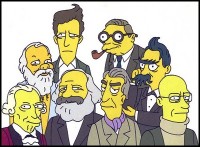PACTISS recommends

Where science meets art. The only necessary and sufficient book store in Melbourne.
Hope our friends enjoy the new look and feel – now optimised for mobile devices for access on the go.

PEOPLE
-
Coordinator: Peter Ellerton
Web guy: Jason Etheridge RESOURCE COLLECTIONS
NEW RESOURCES
-
- A nice Philosophy of Mind summary
- The power of categorical logic
- What exactly is the scientific method and why do so many people get it wrong?
- Paralympic athletes faster than olympic athletes — what does this tell us about difference?
- Logic: if + then = why? How can we understand the power of logic?
- How do we ensure we are exposed to new ideas? A parody with bite.
- A Life of Meaning (Reason Not Required) – What is the nature of our relationship with reason?
- Can you name this cognitive bias?
- By what measures can we value human life?
- Teaching philosophy improves standardised scores
- Are we in control of our own decisions?
- Neuroscience and education: myths and messages
- Free will is not as free as we think – and that’s ok.
- Where’s the Proof in Pseudoscience?
- Science in the lead?
RANDOM POSTS
-
- Are people-smugglers agents of freedom?
- Putting a brake on tolerance
- Correlation Does Not Imply Causation
- We are all just computer simulations
- Decartes Evil Demon
- Sex, brains, robots and Buddhism: looking for free will
- Pseudoscience - miracle cure
- Science and art from Dilbert
- A Critical Thinking Matrix
- Reasons for Reason
USEFUL RSS FEEDS
 Philosopher’s Zone
Philosopher’s Zone NYTimes – The Stone
NYTimes – The Stone Philosophy Now
Philosophy Now RSA Animate
RSA Animate- The Green Corridors Initiative
- Governance governing government
- Why print money when we can print wealth?
- Building a resilient health and care system
- We'll always have Paris?
- Experimentation and equity in global cities
- Technology-enabled deliberative democracy
- Healthier placemaking
- Creating a sovereign wealth fund in Wolverhampton
- Economic recovery and climate action
 Scientific American – Mind and Brain
Scientific American – Mind and Brain- Asexuality Research Has Reached New Heights. What Are We Learning?
- Political Ads Can Target Your Personality. Here's What Could Go Wrong
- Why Writing by Hand Is Better for Memory and Learning
- People with Myalgic Encephalomyelitis/Chronic Fatigue Syndrome May Have an "Exhausted" Immune System
- How to Close the 'Orgasm Gap' for Heterosexual Couples
- Virtual Bar Scenes Are a New Tool to Study Why People Commit Crimes in the Heat of the Moment
- Anger Can Help You Meet Your Goals
- How Sleep Engineering Could Help Heal the Brain
- Dominatrices Are Showing People How to Have Rough Sex Safely
- Farmers in Crisis, Long Overlooked, Are Finally Getting Mental Health Support
 TED talks
TED talks- War journalism should be rooted in empathy — not violence | Bel Trew
- The problem with food and climate — and how to fix it | Jonathan Foley
- How buildings can improve life — inside and out | Doris Sung
- The satellite helping slow climate change — right now | Millie Chu Baird
- What's possible when the arts belong to everybody | Lear deBessonet with Brian Stokes Mitchell
- “Cant de la Sibil·la” / "Quien Más Me Ama" | Maria Arnal
- Bravery, brilliance and RuPaul Charles | On the Spot | RuPaul Charles
- How to claim your leadership power | Michael Timms
- Why young people are worse off than their parents — and what to do about it | Scott Galloway
- Quantum computers aren't what you think — they're cooler | Hartmut Neven
THEMED RESOURCES
- July 2024MonTueWedThuFriSatSun123456789101112131415161718192021222324252627282930311234
Author Archives: Peter Ellerton
Post modernism explained?
Obviously simplistic, but ripe for comment!
Philosophy of Religion website
A wonderfully organised overview of the classic philosophy of religion issues, arguments and problems. http://www.philosophyofreligion.info/
What’s logic got to do with it? – Some of the greatest flashes of scientific inspiration were sparked by utterly illogical thinking.
POPULAR belief has it that science is the preserve of logical Mr Spocks. A great scientific discovery must surely spring from a series of logical steps, each taken coolly and calmly, in the rational order. But take some time to … Continue reading
Top Ten Evolution Myths – and how we know it really happened (pdf)
Often misunderstandings about evolution are really misunderstandings about how science operates. This document deals with both rather nicely. Philosophy of Science. From the Skeptics Society. Top Ten Evolution Myths (pdf)
Hooked on Horoscopes (pdf)
We may not be able to persuade people that astrology and graphology are nonsense, but psychology, with the help of a showman, reveals why they are so popular. The Barnum effect. Psychology and critical thinking. Hooked on horoscopes (pdf)
Posted in Booklets, Handouts and Worksheets, Critical Thinking
Tagged Peter Ellerton
Leave a comment
Richard Feynman on the nature of science
A beautiful analogy between science and chess.
Consciousness – science tackles the self (pdf)
We know that we are aware of ourselves. But we don’t know how. And we are not even sure why. The answers may lie in the physical processes of consciousness 01 April 1989 by SUSAN BLACKMORE New Scientists Magazine issue … Continue reading
Philosophy in Senior Schools
(From my appearance on ABC Radio National’s ‘Philosopher’s Zone) http://www.abc.net.au/rn/philosopherszone/stories/2007/1911312.htm Philosophy is about asking childlike questions – how do we know the world exists? How do we know it hasn’t just started existing? Why can’t we go back in time? … Continue reading
Some important tools of critical thinking
(from my Ockham’s Razor appearance on the ABC’s Radio National) http://www.abc.net.au/rn/ockhamsrazor/stories/2010/2975629.htm Robyn Williams: And now, the bad news. No, don’t run off – this is interesting – even Quite Interesting, as Stephen Fry might say. Here I’ll quote directly from a … Continue reading
Logic in conversation
Why knowing deductive logic is not always an advantage.. Another Dilbert classic.
Meat without slaughter: ‘6 months’ to bio-sausages – science-in-society – 31 August 2011 – New Scientist
Meat without slaughter: ‘6 months’ to bio-sausages – science-in-society – 31 August 2011 – New Scientist.
